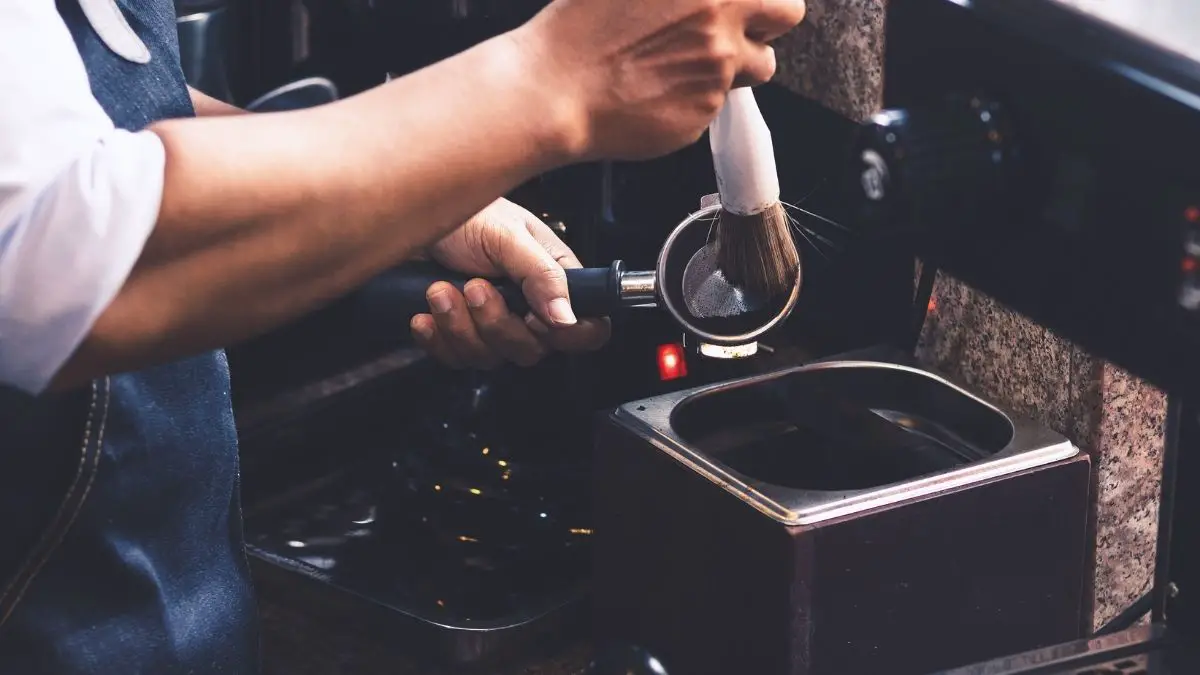Like most appliances, coffee makers require maintenance to prolong their lifespan. And to do that, you typically need to use a cleaner—a liquid chemical that removes the oil buildup and other residues from coffee makers. It’s a highly effective cleaning agent, but due to its harsh nature, there have been some controversies pertaining to the safety of cleaners as people claim they supposedly contain toxic chemicals.
Most coffee maker cleaners only contain chemical compounds that are safe to use and approved by the Food and Drug Administration (FDA).
So, what exactly is in coffee maker cleaners, and why do people make such a fuss about their safety?
This article will answer that question and more, so try to keep up.
What Is In Coffee Maker Cleaners?
The ingredients may vary from product to product, but most coffee maker cleaners you’ll find on the market usually contain five chemical compounds. Let’s take a look at each one:
| INGREDIENT | PURPOSE | DESCRIPTION | SAFE/TOXIC |
|---|---|---|---|
| Citric Acid | pH Adjuster | Citric acid is a weak and non-toxic acid that you can find in most citrus fruits like oranges and lemons. Manufacturers often use citric acid to lower pH levels on chemicals and is an excellent cleaning agent. | Safe |
| Sodium Bisulfate | pH Adjuster | Sodium bisulfate is yet another natural acid that can lower the acidity of a solution. You can find it in dishwasher cleaning products and is generally safe for consumption, according to the FDA. | Safe |
| Glycols and Polyethylene | Processing Aid | Glycols and polyethylene are organic compounds often used as raw materials for manufacturing. | Safe |
| Sodium Acetate | Processing Aid | Sodium acetate is an organic sodium salt you can find in food in the form of additives. Hence, it’s safe. | Safe |
| Sodium Carbonate | Buffering Agent | Sodium carbonate is a natural compound that helps control the pH levels in cleaning agents. | Safe |
As you can see, all of these are safe and non-toxic. Therefore, it’s safe to assume that most coffee maker cleaners won’t cause adverse effects to your body when used. Keep in mind, though, that there may be certain cleaners that secretly contain toxic ingredients, but that’s rarely the case.
Note that coffee maker cleaners are not the same as descalers.
Coffee Maker Cleaners Vs. Descalers
People often interchange cleaners with descalers, but it’s important to understand that these two aren’t the same. Their purposes are different. Let’s first take a look at how cleaners work and what they do:
What Are Cleaners For?
As you may already know, coffee beans usually have an oily surface. When you run them through a coffee maker, these oils make their way to the machine’s surface and are therefore not in the resulting coffee.
However, a small portion of these oils remains inside the machine, forming an undesirable residue. If left unattended, the residue may cause damage to the machine until it eventually stops working.
Cleaners are essentially what owners must use to remove the built-up oil residue.
What Are Descalers For?
When you brew coffee in a machine, you’re most likely using hard water to brew the beans.
Alas, most water sources are not actually 100% water. At least 1% consists of minerals like magnesium and calcium, and these minerals will accumulate on your machine and eventually create limescale.
Much like oils, a limescale build-up can cause damage to your coffee machine.
As you may have guessed, descalers eliminate this limescale from coffee makers, hence the name. And that is the main difference between coffee maker cleaners and descalers.
Granted, the ingredients of these two products are roughly the same, but it’s essential to realize this fact since you’ll often need to descale AND clean your coffee maker for optimal results.
Now you might be wondering, what if you don’t have both a descaler and a cleaner?
What Happens If You Don’t Clean Your Coffee Maker?
As much of a hassle as it may be, there’s a reason why diligent coffee drinkers rarely forget to clean their coffee machines. For one, gunk and oil residue can cause various undesirable effects.
Here’s a look at some examples of what may happen if you don’t clean your coffee maker:
- The coffee you make using the machine may taste more bitter than intended
- Both the coffee and machine will emit an unpleasant smell
- Gunk and oil residue will clog up the machine and may render it unusable
- The residue may create blockages that will lead to leakage
Of course, you wouldn’t want that to happen with your machine. That’s why if possible, you should clean your coffee maker regularly. But how regular is regular? you may ask.
When Should You Use A Coffee Maker Cleaner?
Since the effects of not cleaning a coffee maker aren’t immediate, it can be difficult to determine if the machine needs cleaning or not. However, there are certain signs that would indicate so, such as:
- Your coffee no longer tastes normal
- The coffee maker is spewing coffee everywhere
- Water is leaking from the machine
- It takes longer to brew a pot or cup of coffee
- The machine is making noises while idle
If any of these signs are familiar, it’s high time you use a coffee maker cleaner. Also, to make sure these things don’t happen on your machine, it’s important that you make it a habit to do the following practices:
- Immediately after you brew coffee, throw out the grounds and filter, wipe down any residue around the basket using a damp towel, and let it air dry while the latch or lid is open.
- By the end of the day, remove any detachable components from the machine and wash them individually using hot water and dishwashing liquid. Let them air-dry afterward.
- Every month, clean the inside of the machine according to the manual. Note that instructions may vary from one brand to another. Use a coffee maker cleaner and descaler.
6 Coffee Maker Cleaners You Should Buy
As stated earlier, not all coffee maker cleaners would have zero toxic chemical compounds. For that reason, you must always check if the cleaner you’re about to use or buy has no harmful ingredients.
In that regard, here are six coffee maker cleaners that are effective and safe.
1. Urnex Coffee Maker Cleaner
Urnex Coffee Maker Cleaner has no odor, is safe to use, and should work on most coffee makers, though many of its users say the product works best with espresso-making machines and automatic coffee makers.
2. Quick & Clean Cleaning Cups
Quick & Clean Cleaning Cups is yet another completely safe, biodegradable, and non-toxic cleaning product. It works best for K cup brewers and comes with six rinse pods per purchase, which should last you for over three months. To use the cleaner, simply pour one cleaner pod and run your machine in one cycle.
3. TriNova Cleaning and Descaling Solution
TriNova Cleaning and Descaling Solution should work on most coffee makers, including espresso machines, single-cup makers, and drip coffee makers. It may also work with other types of appliances.
4. Bar Keepers Friend Coffee Maker Cleaner
If your coffee maker is primarily made out of stainless steel, Bar Keepers Friend Coffee Maker Cleaner would be the perfect cleaning product for you. It works well with the material, though it’s a bit harsh, so you might want to wear gloves when handling the liquid.
5. Brew Rite Coffee Maker Cleaner
Like the previous product, Brew Rite Coffee Maker Cleaner works exceptionally well with stainless steel coffee makers. It also doesn’t leave a sour odor, or any odor at all, on the machine, which is rarely the case with cleaning products.
6. Urnex Biocaf Machine Cleaner
Urnex Biocaf Machine Cleaner is best known for being organic, seeing as how it’s made of 100% natural ingredients. While it may be a bit more pricey than other products, it’s as effective as they come.
How To Clean A Coffee Maker With Vinegar
If you’re not fond of coffee maker cleaners, or if you can’t get one, for some reason, you can always clean your machine with vinegar. If you’re curious how, the following steps should help out:
- Fill the reservoir with water.
- Add four cups of vinegar to the water.
- Run the machine through a brewing cycle.
- Throw out the vinegar-water solution after the cycle.
- Fill the reservoir with water again.
- This time, run the machine through the brewing cycle immediately. Do this two to three times.
- Throw out the water.
This should rid the machine of oil and gunk residue. If some parts have become rock solid, you can always get rid of them manually with a towel. Regardless, you can clean a coffee maker without buying expensive products. You may also substitute vinegar with other natural ingredients, such as baking soda.
Closing Thoughts
Your coffee machine may be durable, but it’ll eventually stop working, especially if you’re not maintaining and cleaning it properly. That’s what coffee maker cleaners are for—to help you clean the machine quickly and without much effort. But if you’re the cautious type, you may feel inclined to think that some cleaners contain substances that can damage your machine, and that’s completely understandable.
But if you’ve been paying attention, you should know by now that coffee maker cleaners are often safe and non-toxic. Therefore, you should have no worries about using one on your coffee machine.

